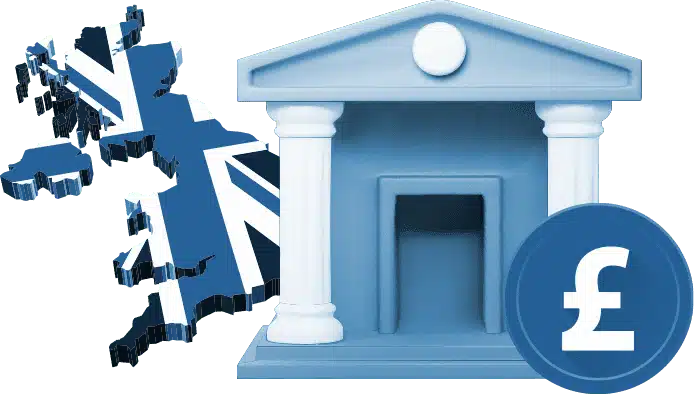Bank Of England

- What is the Bank of England?
- How Does the Bank of England Work?
- Structure of the Bank of England
- Functions of the Bank of England
- The BoE in Fundamental Analysis
- How to Trade on BoE Decisions?
“The empire on which the sun never sets” is more than a figurative depiction of the United Kingdom’s glory, but also a literal truth. Embodied in the 16th century, the British Empire once had control over a quarter of the planet, and the sun never stopped shining on its territories which stretched from Australia to Canada.
In over 400 glorious years, the Brits collected a massive wealth from everywhere around the world and brought to their homeland. And the British royal family trusts the Bank of England to hold and manage the wealth of the nation and their own since 1694.
See a trading opportunity? Open an account now!
What is the Bank of England?
The Bank of England (BoE) is the United Kingdom’s central bank and serves the U.K. government as the official banking institution for monetary affairs. The central offices of the BoE are in Threadneedle in London’s financial district, which is also the basis of its nickname, “the Old Lady of Threadneedle Street.”
The Bank of England is the world’s eighth oldest bank and a structural model for most central banks around the world.
It was established in 1694 as a private entity and remained private for 250 years until it was nationalised in 1946. In 1998, the BoE evolved to become an independent public organisation wholly owned by the Treasury Solicitor.
In addition, the Bank of England acts as the official gold custodian of the U.K and other central banks worldwide. The bank’s gold vaults hold about 400,000 gold bars estimated to be worth over £200 billion and represent about 3% of all gold mined in history.
How Does the Bank of England Work?
As the top monetary and financial authority in the United Kingdom, the Bank of England assumes the role of guarding the wellbeing of the British economy as well as the financial system. The BoE’s primary responsibilities are:
- Overseeing the national economic health
- Issuing banknotes, setting interest rates, and governing the value of British Pound Sterling (GBP)
- Planning and executing monetary policy in alignment with the government’s economic policies
- Implementing economic interventions to manage economic growth
- Regulating and ensuring the integrity of banks, financial institutions, and financial markets
- Acting as the lender of last resort in financial matters
- Custodianship of the gold reserves in the United Kingdom
Structure of the Bank of England
The hierarchical structure of the Bank of England is comprised of the Governor, the Court of Directors, and a few subcommittees.
The Governor of BoE is selected from within the bank, holding the most senior executive position and participating in all committees. The Court of Directors is the main administrative body and oversees the bank’s operations, strategies, and resource allocations. Among the prominent subcommittees:
- Monetary Policy Committee (MPC) implements monetary policy and sets the interest rates
- Financial Policy Committee (FPC) ensures stability in the financial system
- Prudential Regulation Authority (PRA) regulates the Financials industry
Functions of the Bank of England
The principal function of the Bank of England is to ensure and maintain financial stability and monetary stability. Financial stability is achieved by the cooperation of the FPC and the PRA, while monetary stability is in the MPC’s responsibility.
Financial Stability
The FPC strives to maintain the operational health of the national finance system by identifying systemic risks and supporting the government’s economic policy. On the other hand, the PRA regulates banks, financial institutions, and financial markets to ensure the integrity and fairness of the financial services provided to British consumers.
Monetary Stability
The MPC’s responsibility for monetary stability involves maintaining stable prices in the economy and controlling the GBP value. It reaches the objectives by planning the country’s monetary policy, setting the United Kingdom interest rates, and intervening the economy when the alarm bells are ringing.
The nine-member committee is led by the governor and includes three deputy governors, BoE’s chief economist, and four other non-executive members. Each member has an equal-weight vote, and the decisions are finalised with simple majority votes.
The MPC has full autonomy on the monetary policy, though the government’s economic policy is often taken into account for strategic coherency. However, the committee’s autonomy on interest rates is limited by the Treasury, who has the power to enforce the MPC to take specific decisions if necessary.
The Bank of England in Fundamental Analysis
The influence of the BoE on the U.K. economy is based mostly on the interest rate decisions and other economic interventions by the Monetary Policy Committee.
The committee meets eight times a year to evaluate the economic performance in the light of monetary policy goals for Gross Domestic Product (GDP), inflation level, and unemployment rate.
When the figures are wide off the mark, positively or negatively, the MPC can use the tools at its disposal to bring the economy back on track.
The main tools of the MPC are interest rate decisions, asset purchase facilities, and minimum reserve requirements.
Each tool aims to modify the money supply in circulation, whereby greatly impacting the value of the British Pound Sterling and other U.K. assets.
BoE Interest Rate Hike
When the U.K. economy is performing too well, rising inflation can cause unemployment due to high salary demands of the employees and lead to reduced consumer spending. The MPC can adopt a hawkish attitude and slowdown the growth with an interest rate hike, which would add value to GBP.
Higher interest rates would increase the yields of relatively passive securities like savings, bonds and U.K. Gilts, which would encourage the investors to redirect their active capital from riskier assets. At the same time, expensiveness of loans would discourage people from adding more cash into the economy, thereby reducing the demand, and slowing down the inflation.
BoE Interest Rate Cut
In the opposite scenario, when the economy is underperforming, the BoE can use stimulations such as interest rate cuts and asset purchase programs. Reducing interest rates would allow people to loan and contribute toa consumption economy while encouraging businesses to make more investments and increase employment.
Lower interest rates would also attract passive capital to stock market. Investors would be expecting the companies to expand their business operations and increase production. Eventually, the profitability of the companies would increase and yield higher stock dividends.
How to Trade with the Bank of England Decisions?
Bank of England interest rate decisions by the MPC have strong implications on the values of the British Pound Sterling, the stocks traded in the London Stock Exchange (LSE), and the U.K. Government Bonds.
Hence, the BoE central bank meetings are anticipated eagerly by the news trading strategists in the financial markets, and the market turmoil is observable in the price trends until the meeting starts.
At the conclusion of a meeting, the bank announces the decisions with an official statement. The BoE Governor holds a press conference to explain the bank’s economic outlook and the reasoning behind their decisions.
Minutes of the meeting are also released, which contains the discussions of the MPC members and give information about what they expect to happen in the near future.
If the BoE decides to decrease the interest rates, in congruence with analyst forecasts, the GBP and the bonds will lose value, while U.K. stocks and, possibly, commodities will rise.
If they raise the interest rates, GBP will gain value against other currencies, the bonds will rise, and the stocks will drop.
However, under abnormal economic circumstances like recession, the market reaction would depend on the expectations towards the measures BoE might take.
The extremely volatile reactions usually happen when the market sentiment shifts dramatically due to a surprise development. The sentiment is often affected by the clues in the meeting minutes and press conference more than the actual decisions.
Large-scale investors base their long-term investments on how the BoE (and, therefore, them) thinks the future will shape for the British economy and take positions accordingly.
As such, when the BoE takes investors by surprise, the U.K. assets experience wide price movements, which create many high-risk & high-return opportunities.
Disclaimer – While due diligence, care and research have been undertaken to compile the above content, it remains an informational and educational piece only. None of the content provided constitutes any form of trade or investment advice or recommendation and should not be construed as such.
Trading the Bank of England Events with Friedberg Direct, Powered by AvaTrade Technology
The BoE Monetary Policy Committee meets eight times a year to make interest rate decisions. Every event can be as golden as the bank’s precious metal reserves. Following the economic indicators monitored by the MPC and performing a thorough fundamental analysis can reveal the potential BoE interest rate hikes and cuts.
With multi-asset CFDs and Forex pairs from a broker like Friedberg Direct powered by AvaTrade Technology, you can take advantage of the opportunities that arise from the Bank of England central bank meetings.
- BoE Events Schedule: Check our economic calendar to learn the time and date of the next BoE event, and mark it on your calendar.
- A Rich Selection of U.K. Assets: Trade GBP/USD currency pair and British assets like Barclays stocks, Vodafone stocks, and FTSE 100 index with great trading conditions.
- Be Prepared for Everything: As a CFD broker, Friedberg Direct Powered by AvaTrade Technology enables trading both directions of the price with Long and Short positions, without having to own the assets!
- Manage Risk with Confidence: You can hedge your positions against the volatility during BoE interest rate decisions using Vanilla options trading and stop loss order.
- Never Walk Alone: Our technical support team is ready to assist you via phone, live chat, or e-mail. However, please note that we are prohibited by regulations from providing any kind of personal outlook comments and opinions, trading advice or recommendations..
The Royal Family trusts the Bank of England with its wealth and monetary affairs. Now that you know how the BoE takes care of the economy and how the MPC interest rate decisions affect the value of GBP and other British assets get yourself prepared with our state-of-the-art trading tools and start trading with confidence!
See a trading opportunity? Open an account now!







